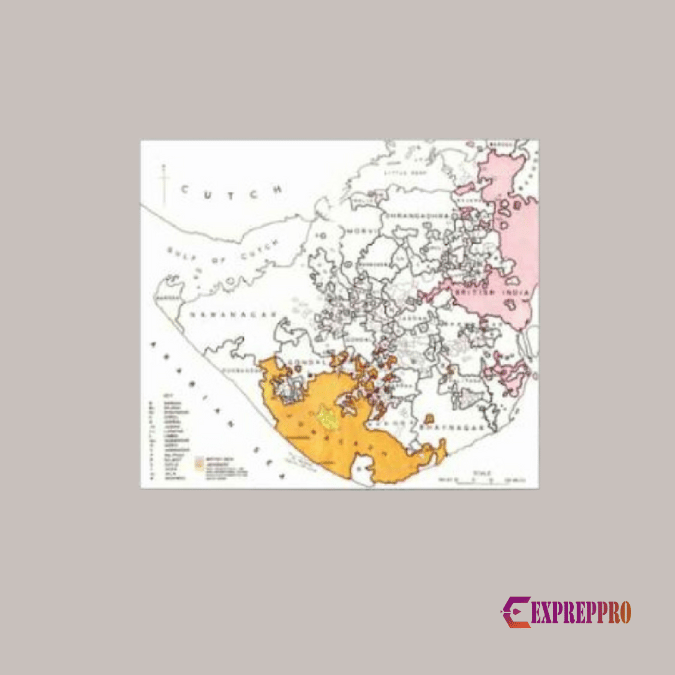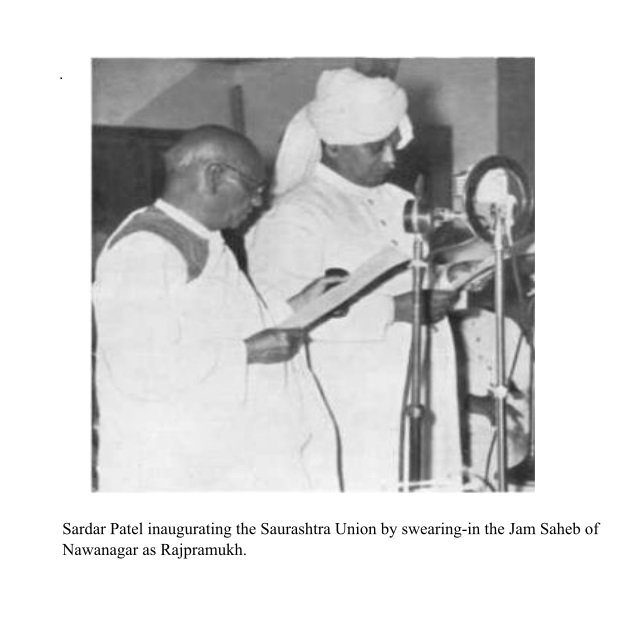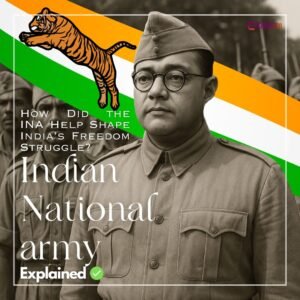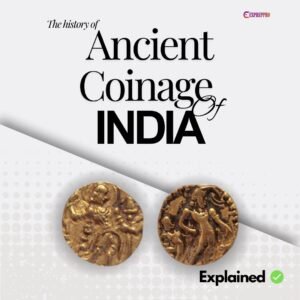
THE PRINCELY STATE OF JUNAGADH
A princely state with 3,337 square miles that spans from Girnar hills to the Arabian Sea with a Hindu majority population, ruled by a Muslim nawab, created a problematic situation for Sardar Vallabhai Patel and his team. Several enclaves of Junagadh were embedded in the neighbouring regions of Bhavnagar, Nawangar and Gondal. Access to certain areas belonging to Baroda state was only possible through this state. Moreover, the presence of major Jain and Hindu shrines elevated its importance.
The Nawab preferred Pakistan even though no part of his state shares a border with Pakistan or no part was remotely close to Pakistan. Its port, Veraval, was about 300 miles away from Karachi.
HISTORY-
Junagadh was a Rajput state under the Chudasama dynasty until 1472 or 1473. Sultan Muhamad Bedga of Ahmedabad conquered this Rajput State. During the period of Mughal ruler Akbar, this state became a dependent state under Ahmedabad subah. In 1735, Sherkhan Babi expelled the Mughal governor and established his rule in the state of Junagadh, and his descendants ruled this state till 1947.
INITIAL STAGES –
The ruler Nawab Muhammed Mahabat Khan was a person with unusual character and a great canine lover who paid little attention to any matters related to his subjects. He even organised a wedding of two dogs and spent considerable money on this canine marriage. He even proclaimed a state holiday for this marriage.
During the time of independence, the Nawab was in a confusion. On 22 April, Khan Bahadur Abdul Kadir Mohammed Hussain, the diwan, categorically denied the allegation that his state was planning to join Pakistan. On 25 July 1947, Nabi Bakshi informed Lord Mountbatten, Sardar Vallabhai Patel, and Jamsaheb, the ruler of Nawanagar, of Junagadh’s intention to join India.
But the appointment of Sir Shah Nawaz Bhutto( Sir Bhutto was the father of Zulfikar Ali Bhutto) to Nawab’s council changed history.
ARRIVAL OF SIR SHAH NAWAZ BHUTTO –
It was the diwan Abdul kadir Muhammad Hussain brought Sir Shah Nawaz Bhutto to Junagadh’s council.In May 1947, the Diwan went for medical treatment. Sir Bhutto utilised this situation and pressured Nawab to oust the then Diwan. Sir Bhutto became the new Nawab and informed Mr. Iyengar about the decision not to join the constituent assembly of India. He also added that the choice to abstain from the constituent assembly was their legal right.
The Maharaja of Nawanagar and Maharaja of Dhrangadhra informed Mr V.P. Menon about the possible consequences of Junagadh joining Pakistan.
On 11 August 1974, the states ministry officially sent the instrument of accession to the Nawab for this signature. But he kept it in abeyance and maintained a deafening silence.
MEMORANDUM BY HINDUS-
On 13 August 1947, Sir Shah Nawaz Bhutto organised a conference of prominent citizens, and on the same day, a group of Hindus submitted a memorandum. They pointed out their concerns and dangers that would come if the state was acceded to Pakistan.
The important points were
1. The geographical importance of the state
2. Security of majority of Hindu subjects.
3. The premier status of Junagadh in Kathiawar would be lost.
4. Trade routes will be affected.
5. Commerce and industries will get crippled, which will eventually result in the loss of income to the state.
6. It Would affect Zortalbi tribute. The tribute the Nawab received from many Kathiwar chiefs was known as Zortalbi.
Bhutto came up with an argument that Kathiwar belonged to Sindh historically. So, it should accede to Pakistan.
Now Sardar and his team realised the real danger. This new situation would have a domino effect and broader implications for other states. It also may disrupt the peace in the Kathiwar region. This Junagadh trouble conferred confidence to other fringe elements. The fanatic Kasim Rizvi (leader of Hyderbad razakars) openly mocked, “Why is Sardar Patel thundering about Hyderbad when he can’t even control little Junagadh?“.
On 15 August 1947, Junagadh formally announced its accession to Pakistan. Now the states ministry changed its gears and tactics.
AFTER 15 AUGUST –
The other rulers of Kathiwar states, like Morvi, Bhavnagar, Gondal, and Porbandar, condemned Junagadh’s decision. The Jamsaheb of Nawanagar reached Delhi to inform about the recent situation. He also briefed about many stories of harassment of the Hindu population of Junagadh. He also informed them that if the problem went like this, it would be difficult to control the people of Kathiwar from retaliation and ultimately result in chaos.
Mr V.P. Menon tried to meet the Nawab. He was received by the Junagadh police I.G. at the state border, and in the meeting at the guest house, Bhutto met Menon. This incident proved Nawab’s incooperative attitude. When the Menon asked about Nabi Bakshi’s assurance, Mr Bhutto said he was no longer attached to Junagadh’s state service.
DOUBTFUL ATTITUDE OF MANAVADAR AND MANGROL –
The Manavadar is a tiny state with about 100 square miles surrounded by Junagadh on three sides and Gondal on the north. It was a Hindu-majority state ruled by the Khan of Manavadar. The Khan also showed unwillingness to join the Indian Union.
Mangrol state is situated between Porbandar and Junagadh, with Hindus being the majority. Mangrol had a unique constitutional position. At the investiture of every ruler, a delegate of the Junagadh state had to be present. After 15 August 1947, Junagadh refused to recognise it. They claimed that Mangrol was its vassal.
Initially, the Sheikh of Mangrol was in a confusion. It was due to the pressure from Junagadh. Even the Sheikh of Mongrol could not travel by car through Junagadh territory. If he tries to do so, the Junagadh authorities will stop the vehicle ( to prevent him from meeting Indian officers). Then, to tackle this situation, Mr V.P Menon arranged an official car with a Nawanagar red number plate and eventually brought him out. The Sheikh was ready to join India under one condition. India should acknowledge its independence vis-a-vis Junagadh.
With the lapse of paramountcy, Mangrol is free and deemed to have obtained its independence. The ruler then signed the instrument of accession and the standstill agreement. Later, he tried to retract from accession. Since the governor general had already accepted the accession, the government didn’t act.
THE NEW PARALLEL GOVERNMENT –
On 22 September, Samaldas Gandhi formed a new parallel government of Junagadh (Arzi Hukumat) and decided to start agitation in the state of Junagadh. However, Sardar Patel was unhappy with the decision to create a parallel government. He believed that this might cause complications later on.
This provisional government had six members, with Samalda Gandhi as its president. Later, they moved their headquarters to Rajkot.
JUNAGADH’S REACTION –
Junagadh reacted by sending its troops to Babariawas( a group of 51 villages held by Mulgirasias or original landholders) and claimed that Babariawas belonged to the state of Junagadh. Mulgirasias contended that the political department of paramount power created their attachment with Junagadh. With the lapse of paramountcy, they are not attached to Junagadh and expressed their willingness to join the Indian Union.
On 22 September 1947, India demanded that Junagadh troops be withdrawn from Babariawad. However, the diwan refused to remove the forces. Lord Mountbatten advised taking this matter to the U.N., but Sardar and others refused to consider this suggestion.
The command of Kathiwar defence forces, along with the command of Nawnagar state forces and Bhavnagar, was handed over to Brigadier Gurdial Singh. The troops were suitably deployed all over Kaithiwar’s strategic positions.
On 1 October, Junagadh troops had occupied Mangrol as well. When Nehru informed Liaqat Ali Khan about this new invasion, he argued that the ruler had the absolute right to join Pakistan without reference to the moral or ethnic aspects of accession.
In the meantime, Hindus were fleeing from the Junagadh state and were replaced by outsiders, and these outsiders occupied possessions of vacated Hindu property and lands. This preplanned action was executed to make Hindus a minority in the state so that India would lose the plebiscite.
POLICE ACTION AGAINST JUNAGADH –
On 21 October, the government of India decided to occupy Mangrol and Babariawad, and on 25 October, the final plan was approved. Initially, the plan was to dispatch Central Reserve police, but Sardar was not ready to take any unwanted risks. He opted for the Indian army to handle this situation.
During these days, the Khan of Manavadar was arresting local leaders and harassing the people. If proper action is not taken, this will destroy the communal harmony. The government dispatched a small police force to Manavadar under the command of a director general of police to take over the administration. On 22 October, they finished their job, and a manager was appointed to govern the administration of Manavadar.
On 1 November 1947, India’s government took over the administration of Babariawad and Mangrol.
NAWAB’S REALISATION –
When the Nawab realises that the events go against his plan and anticipation, he leaves Junagadh. He left for Karachi with his family members, the cash balance of the state treasury, shares and securities, and some of his favourite dogs. One of his begums was left back on the tarmac because he was not ready to wait till his begum and her kid. This begum then finds her way to Portuguese-controlled Diu.
The Nawab’s flight encouraged the volunteers of Arzi Hukumat to occupy various parts of the state. According to V.P Menon, the conduct of volunteers in Kuyana was the only disgrace; apart from Kuyana, they exhibited good behaviour.
INDIAN TAKEOVER OF ADMINISTRATION –
On 9 November 1947 N.M Buch, Brigadier Gurdial Singh entered Junagadh.Captain Harvey Jones, the senior member of Junagadh state council, was ordered to go in advance to ensure no resistance. On the same day, Captain Harvey Jones and the Junagadh chief secretary peacefully handed the administration to India.
The state forces were disarmed, and the treasury was sealed. Civil officers, accompanied by small detachments of police or troops, went to important places to take over control.
PROFESSIONAL ATTITUDE OF BRIGADIER GURDIAL SINGH –
Brigadier Singh was a person from West Punjab who lost his entire family, property and belongings in the communal holocaust. During the Junagadh crisis, he behaved professionally without any communal rancour.
A Muslim delegation informed Mr V.P Menon that they had nothing to complain about during or after the accession. Ultimately, their trust was reflected in the plebiscite.
PLEBISCITE –
India decided to conduct a plebiscite and even agreed to conduct it under the auspices of the United Nations. India also declared it will not agree to a joint India-Pakistan plebiscite in Junagadh. Both Pakistan and Britain were incensed.
Great Britain even reported and compared the accession to a somewhat Hitlerian method. But Sardar Patel and V.P Menon shrugged at all of these accusations and false narratives.
On 13 November, Sardar Patel visited Junagadh and attended a meeting on the grounds of Bahauddin College. When he asked the crowd to indicate their wish, Over ten thousand hands were immediately raised in favour of India. During this visit, Sardar proposed reconstructing the famous Somanath shrine from dilapidated and neglected to its original magnificence.
On 20 February 1948, India conducted a referendum under the supervision of C.B Nagarker( incidentally, he was neither a Hindu nor a Muslim). Of 2,01,457 registered voters, 1,90,870 exercised their right, and only 91 voted in favour of Pakistan.In Mangrol, Manavadar, Babariawad, Bantwa, and Sardargarh, only 39 favoured accession to Pakistan( Total votes 31,434).
Jossleyn Hennessy of the Sunday Times and Douglas Brown of the Daily Telegraph, who were in Junagadh, couldn’t find any faults.
THE NEW ADMINISTRATION –
S.W Shiveshwarkar I.C.S was appointed as the state administrator under the regional commissioner’s control. The new government reorganised the administration. Before, the administration was full of imported outsiders, and they conducted the administration communally. An ordinance was issued by the governor general authorising the Reserve Bank of India to issue duplicates of government promissory notes to the extent of rupees 1,29,34,700 as the originals had been lost (Nawab took it with him to Karachi).
FORMATION OF SAURASHTRA –

The rulers of Kathiawar had signed a covenant to amalgamate their states into the Saurashtra Union. After the Saurashtra formation, the Junagadh elected seven representatives through a broad franchise to the constituent assembly of India.
Before the referendum, the escaped Nawab made a proposal before Sri Prakasha, the high commissioner for India in Pakistan. If he is allowed to return then he will accede Junagadh to India. Sri Pakasa was however instructed not to commit the government of India in any manner.



